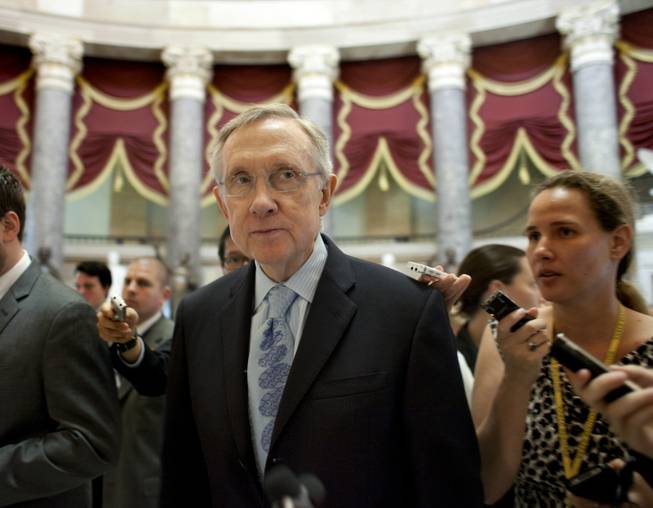
Associated Press
Senate Majority Leader Harry Reid speaks with reporters as he walks to the office of House Democratic Leader Nancy Pelosi Sunday, July 31, 2011.
Sunday, July 31, 2011 | 3:40 p.m.
Sun Archives
The debt bargain being struck between President Obama and Republican Leader Mitch McConnell already has its first outside co-sponsor: Senate Majority Leader Harry Reid, provided he can bring the bulk of his Democrats along.
Lawmakers in both parties will spend Sunday evening in their respective party caucuses and conferences, getting briefed on a plan that is already inspiring a miniature revolt as they glean the details of a deal that appears to have been struck, if not yet unveiled.
The deal as it stands raises the debt limit $2.4 trillion (through the first few months of 2013) on the back of a $2.7 trillion reduction in savings, broken into two parts: first, approximately $1 trillion cut to discretionary spending, and later, a $1.5 trillion to $1.7 trillion fiscal restructuring, based on cuts and revenues.
Hammering out what changes will make up the second, larger stage of deficit reduction will be the job of a 12-member joint committee of lawmakers, split evenly between Democrats and Republicans. They will have to come up with a budgeting plan that Congress can vote on by the end of 2011.
If they don’t, it will set off a tripwire that no one wants to disturb: across-the-board cuts to yank spending into forcible equilibrium with the end-of-2011 debt. Fifty percent of the chop will be to defense spending. And while Social Security, Medicaid, and veterans’ benefits are expected to be protected, Medicare provider payments are on the block.
With barely more than two days to go until default, time is short. But so are tempers.
“Nada from million/billionaires; corp tax loopholes aplenty; only sacrifice from the poor/middle class?” tweeted Rep. Donna Edwards, a Democrat from Maryland who’s also in charge of recruiting 2012 candidates for the House Democrats’ campaign wing. “Shared sacrifice, balance? Really?”
Democrats wanted a final deal to include revenues, in the form of ending tax breaks for corporations, luxury items, and the wealthy. And as the details of a plan began to emerge, the Congressional Black Caucus, led by Rep. John Conyers and Rep. Emanuel Cleaver III, began to angle for the most nuclear of the back-up options, appealing to the President to ignore congressional instruction, and just unilaterally raise the debt limit. Their petition represents 42 Democrats.
There was also firm opposition from leaders of the House Progressive Caucus — some of whose 74 members are also members of the Black Caucus. Chairman Raul Grijalva of Arizona put his position on the emerging compromise bluntly in a tweet Sunday afternoon: "We're trading working Americans' livelihoods for #GOP radical votes. I'm a no."
House Democrats' Leader Nancy Pelosi wouldn't commit to any assessment of her caucus Sunday night. "We all may not support it, or none of us may be able to support it," she told reporters outside her office. Pelosi is not grouping up House Democrats until Monday to hash out their position on the compromise plan.
Across the aisle, McConnell — whose communications director tried to quash rumors of a deal — was meeting with House Speaker John Boehner in his office.
Right-wing Republicans are getting egged on by conservative bloggers to hold rank against the deal — as they almost did last week against House Speaker John Boehner’s bill — because it sets them up down the line with a devil’s dilemma: either vote to raise taxes, or let seniors and soldiers take the hit.
“Republican Leaders are asking their members to accept tax increases or massive defense cuts and senior anger right before the election,” wrote Erick Erickson of RedState.com. “GOP leaders were collaborating on this. Boehner wanted a grand bargain and now he’s going to get it along with tax increases.”
Boehner had not endorsed the emerging deal as of Sunday evening, and the Tea Party-inspired Republicans that refused to go along with his bill — a near-replica of the “Cut, Cap and Balance” plan — aren’t likely to come along on something that’s moved closer to the center aisle.
Rep. Jason Chaffetz of Utah, a ringleader for conservatives in the House who did support Boehner's plan last week, was noticeably pessimistic on this one, telling an NBC reporter Boehner was "going to have his hands full on this one."
With so much resistance, the math is going to be tricky — especially in the House.
Senate Tea Partyers and ultra-liberals may not back the plan, but they’ve also agreed not to block it, meaning that once legislation arrives from the White House, there should be no hold-up to putting the bill on the floor, and putting it up for a regular-majority vote.
Similar procedures aren’t available to lawmakers in the House. But the cry of no more taxes rings through the GOP further than just the Tea Party, and a hefty plurality of Democrats are unflinching when it comes to social spending programs, especially if cuts aren’t balanced with revenues.
House Democrats are also freer to vote their conscience: because so many of them lost their seats in the midterm elections, the ones who are left represent, by and large, seats that are more safely Democratic than has been the case in the House in congresses past, or is the case in the current Senate.
The magic number is 217, including the speaker: it’s a count that’s going to have to include Democrats and Republicans.
But if Boehner wants to be able to claim this as a victory, he's got to retain a majority of the majority that carries the bill.
That means at a minimum, he needs 120 Republicans to sign up to support the plan. Any less, and it's really the House Democrats who will have steered the country back from the brink on the back of a Republican-dominant plan.


Join the Discussion:
Check this out for a full explanation of our conversion to the LiveFyre commenting system and instructions on how to sign up for an account.
Full comments policy